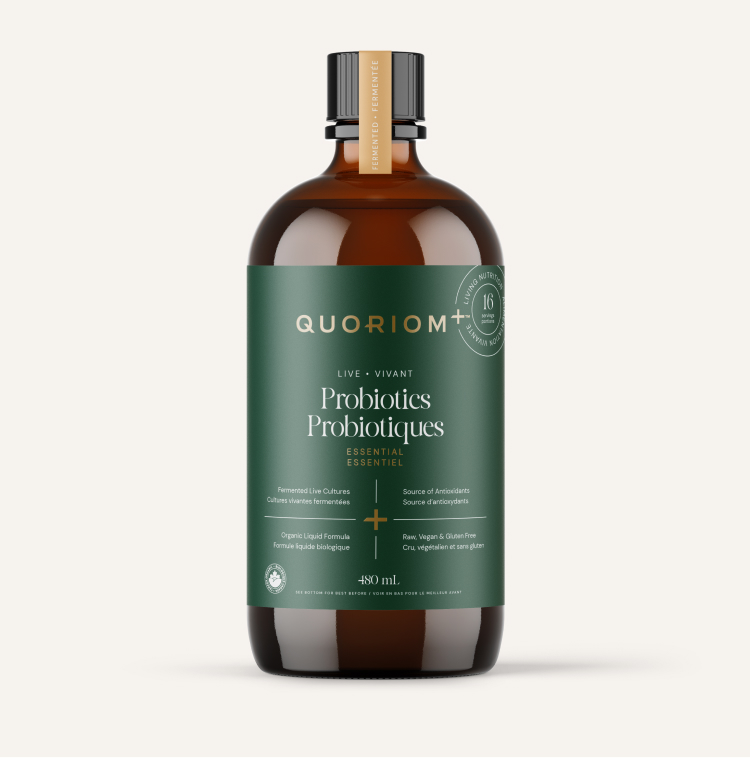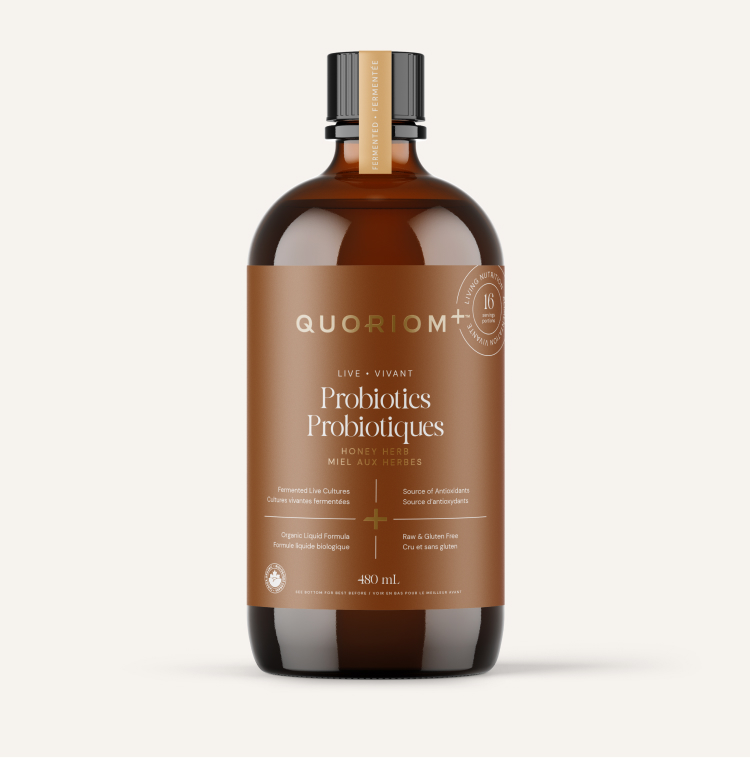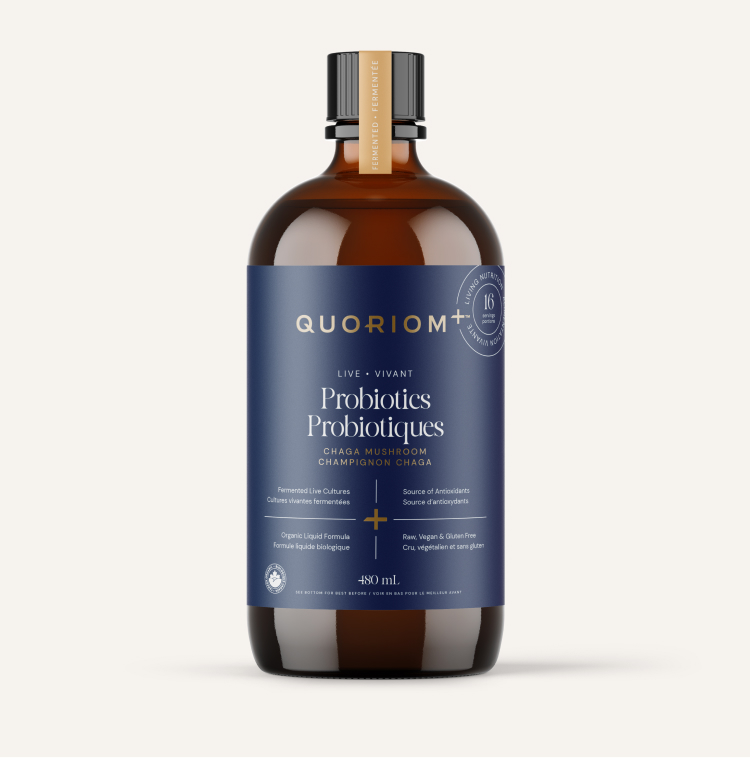

Shop our small batch fermented liquid probiotics.
Incredible ingredients.
Explore the ingredients that make up the essence of Quoriom+, where every drop is crafted with precision and care. From the robust Chaga Mushroom to sweet Raw Honey, each ingredient is a testament to the dedication to your well-being.
Chaga mushroom
Renowned for their antioxidant-rich profile, Chaga mushrooms offer a natural boost to immune function and overall well-being, making them a compelling choice for those seeking to fortify their health through a time-honoured natural remedy.
Heart-warming honey
Celebrated for its diverse array of antioxidants and antimicrobial properties, honey is a natural powerhouse that not only adds sweetness to life but also promotes overall well-being.
Marvelous milk thistle
As a liver-supporting marvel, milk thistle boasts powerful antioxidant and anti-inflammatory properties, making it a natural choice for those seeking to nurture their liver health and promote overall wellness.
Healing herbs
Rich in vitamins, minerals, and antioxidants, herbs offer numerous benefits including aiding and strengthening digestion and immune function. When added to probiotic fermentation, their bioavailability is enhanced creating a potent blend for overall well-being.
Powerful probiotics
Multiple probiotic strains provide diverse health benefits, addressing different facets such as gut health and immunity. Their synergistic effects and improved stability boost effectiveness, addressing multiple conditions while supporting personalized gut health.
Mineral-rich molasses
Abundant in iron, calcium, potassium, and magnesium, molasses facilitates probiotic growth in a natural, organic fermentation, enhancing potency. Compounds in molasses act as complementary prebiotics, fostering a healthier gut microbiome for improved digestive health.
Anise
Licorice root has been used for centuries in traditional medicine for its versatile health benefits. Notably, it possesses anti-inflammatory and immune-boosting properties, making it beneficial for respiratory issues like coughs and colds. Studies indicate that licorice may help alleviate symptoms of gastrointestinal disorders such as indigestion and acid reflux. Moreover, its natural sweetness makes it a popular ingredient in herbal teas, offering a pleasant way to harness its medicinal properties.
Basil
Basil is not only a culinary herb but also boasts medicinal properties. Research suggests that basil contains compounds with antioxidant and anti-inflammatory effects, potentially benefiting heart health and reducing the risk of chronic diseases. Additionally, basil extracts have shown antimicrobial activity against various pathogens.
Dill
Dill is prized for its culinary uses and medicinal properties. It is commonly used to aid digestion and alleviate symptoms of gastrointestinal discomfort. Studies suggest that dill may have antimicrobial properties, potentially helping to combat certain bacterial infections. Additionally, dill extracts have demonstrated antioxidant effects in research settings.
Ginger Root
Ginger is renowned for its anti-nausea properties and digestive benefits. Research indicates that ginger may help alleviate nausea and vomiting associated with motion sickness, chemotherapy, and pregnancy. Its anti-inflammatory effects have also been studied for potential use in managing conditions such as osteoarthritis and muscle pain.
Juniper
Juniper berries are traditionally used in herbal medicine for their diuretic properties, promoting urinary tract health and reducing water retention. Some studies suggest that juniper extracts may possess antimicrobial activity against certain bacteria and fungi. Additionally, juniper has been investigated for its potential antioxidant effects.
Oregano
Oregano is not only a flavorful herb but also boasts antimicrobial properties attributed to its high content of essential oils such as carvacrol and thymol. Studies suggest that oregano extracts may help combat bacterial and fungal infections, making it a potential natural alternative to conventional antimicrobial agents.
Parsley
Parsley is rich in vitamins, minerals, and antioxidants, making it a valuable addition to a healthy diet. Research indicates that parsley may have diuretic effects, promoting urinary tract health and reducing water retention. Additionally, parsley extracts have shown potential in inhibiting the growth of certain bacteria and fungi.
Peppermint
Peppermint is prized for its refreshing flavor and numerous health benefits. Research suggests that peppermint may help alleviate symptoms of irritable bowel syndrome (IBS), including abdominal pain and bloating. Its anti-nausea properties have also been studied for potential use in relieving chemotherapy-induced nausea and vomiting.
Rosemary
Rosemary contains compounds with antioxidant and anti-inflammatory properties, potentially benefiting brain health and reducing the risk of chronic diseases. Studies suggest that rosemary extracts may help improve cognitive function and memory retention. Additionally, rosemary has been investigated for its potential antimicrobial effects.
Sage
Sage is valued for its medicinal properties, including its potential to improve cognitive function and mood. Research suggests that sage may help enhance memory and attention, making it a promising natural remedy for age-related cognitive decline. Its antimicrobial properties have also been of interest in various studies.
Thyme
Thyme contains compounds with antioxidant and antimicrobial properties, potentially benefiting respiratory health and immune function. Research indicates that thyme extracts may help alleviate symptoms of respiratory infections, including coughs and sore throats. Its anti-inflammatory effects have also been studied for potential use in managing conditions such as bronchitis and asthma.
Lemon Verbena
Lemon verbena is renowned for its aromatic leaves and numerous health benefits. Rich in antioxidants, it aids in digestion, reduces inflammation, and promotes relaxation. Studies suggest that lemon verbena may alleviate muscle damage and soreness post-exercise due to its anti-inflammatory properties. Additionally, its calming effects have been linked to improved sleep quality and stress reduction. Incorporating lemon verbena into teas or infusions can offer a flavorful way to enjoy its therapeutic benefits.

Rooibos
Rooibos, a caffeine-free herbal tea from South Africa, is celebrated for its antioxidant-rich profile and potential health benefits. Research suggests that rooibos tea may improve heart health by lowering blood pressure and cholesterol levels. Its anti-inflammatory properties may also alleviate allergy symptoms and support skin health. Additionally, studies indicate that rooibos tea consumption may contribute to better glucose control, making it a promising option for managing diabetes.
Chamomile
Chamomile is cherished for its calming effects and gentle, floral aroma. Renowned for its soothing properties, chamomile tea is often recommended for promoting relaxation and aiding sleep. Studies suggest that chamomile may reduce anxiety symptoms and improve overall mood due to its flavonoid content. Furthermore, chamomile's anti-inflammatory properties may benefit digestive health by easing symptoms of irritable bowel syndrome (IBS) and promoting gut motility. Whether enjoyed as a warm beverage before bedtime or used topically in skincare, chamomile offers a multitude of health benefits backed by scientific research.
Fennel
Fennel seeds are often used to aid digestion and relieve symptoms of bloating and gas. Research indicates that fennel may have anti-inflammatory and antioxidant properties, potentially benefiting heart health and reducing the risk of chronic diseases. Some studies also suggest that fennel extracts may possess antimicrobial activity against certain pathogens.
Turmeric
Curcumin, the active compound in Turmeric, offers powerful anti-inflammatory and antioxidant properties and has been shown to improve oxidative stress markers. Studies suggest curcumin may aid in cancer prevention and treatment by inhibiting cancer cell growth, enhancing chemotherapy and radiation therapy effects, reducing metastasis risk, and alleviating symptoms. It may improve quality of life for cancer patients and serve as adjunct therapy, with research suggesting benefits across various cancer types.
Fenugreek
Fenugreek seeds are valued for their numerous health benefits, including improving blood sugar control and supporting lactation in nursing mothers. Studies suggest that fenugreek may help lower blood glucose levels and improve insulin sensitivity, making it a potential adjunct therapy for diabetes management. Additionally, fenugreek extracts have shown promising results in supporting breast milk production.
Angelica
Angelica root is traditionally used in herbal medicine to aid digestion and alleviate symptoms of indigestion and flatulence. Some studies suggest its potential anti-inflammatory and antimicrobial properties, making it a candidate for further research in managing certain infections and inflammatory conditions.

Nettle
Nettle leaf is valued for its potential anti-inflammatory and antioxidant properties. Research indicates that nettle may help alleviate symptoms of allergic rhinitis (hay fever) and osteoarthritis. Its diuretic effects have also been studied for potential use in supporting urinary tract health.

Elderberry
Elderberry is renowned for its immune-boosting properties, attributed to its rich content of flavonoids and antioxidants. Several studies suggest that elderberry extracts may help reduce the duration and severity of cold and flu symptoms by enhancing immune function and reducing inflammation. Its antiviral effects have been of particular interest in recent research.

Licorice Root
Licorice root is prized for its versatile health benefits, including soothing digestive issues and supporting respiratory health. Research suggests that licorice may help alleviate symptoms of acid reflux, ulcers, and coughs. Its anti-inflammatory and immune-boosting properties have also been of interest in various studies.
Chickweed
High in vitamins and minerals, chickweed soothes the digestive system, kidneys, bladder, urinary tract, bowels, as well as sore throat and lungs. Safe for all ages to take over prolonged periods, it is particularly nourishing for those who are weak, traumatized, anemic, chronically stressed, overworked, or recovering from surgery or a long-term illness.

Butcher’s Broom
Renowned for its medicinal properties, utilizes both its roots and stem in herbal remedies. Its multifaceted benefits encompass enhancing circulation, alleviating constipation, and promoting blood flow to vital areas such as the brain and limbs. Notably, it offers relief from hemorrhoids, rheumatism, arthritis, swelling, cramps, and symptoms associated with chronic venous insufficiency. Additionally, this versatile herb serves as a mild diuretic and laxative, further enhancing its therapeutic value.

Astragalus
This native Chinese herb has traditionally been used as an adaptogen (a substance that protects the body from stress and disease). Astragalus is also used as part of an herbal combination to prevent or treat colds, according to Mount Sinai. It’s thought that astragalus strengthens and regulates the immune system, notes the NCCIH (National Center for Complementary and Integrative Health). Some studies suggest that astragalus may help fight viral infections.



